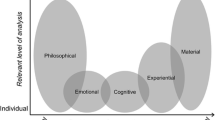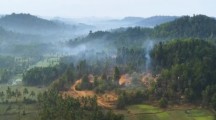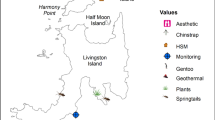Abstract
We collected data through three focus groups conducted with Wabanaki citizens (members of the Penobscot Nation, Passamaquoddy Tribe, Maliseet, and Micmac Nations) residing in Maine, USA, and the Canadian Maritime region. These sessions used a collective storytelling and discussion approach consistent with Wabanaki cultural practices to explore environmental knowledge, information on environmental change, and its impact on traditional lifeways (TLW) over time. Wild foods such as fiddleheads (Matteucia strutiopteris (L.) Tod.), berries such as blackberries (Rubus allegheniensis & R. Canadensis) and strawberries (Fragaria x ananasa), deer (Odocoileus virginianus Zimmerman), fish, and seafood provide not only physical nourishment, but also cultural connections through storytelling, harvesting, processing, and sharing of resources. It is this strong and multifaceted dependence on natural resources and systems that makes Wabanaki citizens particularly “vulnerable” to climate change, but also potentially resilient because of stories and other cultural traditions that help process and understand environmental change. We suggest storytelling continues to remain relevant as a way to connect the generations and for continued adaptation to ecosystem change and sustaining traditions.
Similar content being viewed by others
References
Armitage, D. R., Plummer, R., Berkes, F., Arthur, R. I., Charles, A. T., Davidson-Hunt, I. J., Diduck, A. P., Doubleday, N. C., Johnson, D. S., Marschke, M., McConnery, P., Pinkerton, E. W., and Wollenberg, E. K. (2009). Adaptive co-management for social-ecological complexity. Frontiers in Ecology 7(2): 95–102.
Athayde, S., Silva-Lugo, J., Schmink, M., and Heckenberger, M. (2017). The same, but different: Indigenous knowledge retention, erosion, and innovation in the Brazilian amazon. Human Ecology 45: 533–544.
Bardsley, D., and Edwards-Jones, G. (2006). Stakeholders’ perception of the impacts of invasive exotic plant species in the Mediterranean region. GeoJournal 65(3): 199–210.
Bennett, N. J., Blythe, J., Tyler, S., and Ban, N. C. (2016). Communities and change in the anthropocene: understanding socio-ecological vulnerability and planning adaptations to multiple interacting exposures. Regional Environmental Change 16: 907–926.
Bennett T. M. B., Maynard N. G., Cochran P., Gough R., Lynn K., Maldonado J., Voggesser G., Wotkyns S., and Cozzetto K. (2014). Indigenous Peoples, Lands, and Resources. In Melillo J. M., Terese T., Richmond C., and Yohe G. W. (eds.), Climate Change Impacts in the United States: The Third National Climate Assessment, U.S. Global Change Research Program, pp. 297–317.
Berkes, F., Colding, J., and Folke, C. (2000). Rediscovery of traditional ecological knowledge as adaptive management. Ecological Applications 10(5): 1251–1262.
Brooks, L. T., and Brooks, C. M. (2010). The reciprocity principle and traditional ecological knowledge: understanding the significance of Indigenous protest on the Presumpscot River. International Journal of Critical Indigenous Studies: 11–28.
Brooks, L. T. (2018). Our beloved kin: a new history of the King Philip's War, Yale University Press, New Haven and London.
Chief, K., Daigle, J., Lynn, K., and Whyte, K. P. (2014). Indigenous Experiences in the U.S. with Climate Change and Environmental Stewardship in the Anthropocene. In Sample, V. A., and Bixler, P. (eds.), Forest Conservation and Management in the Anthropocene: Conference Proceedings, RMRS-P-71, US Department of Agriculture, Forest Service, Rocky Mountain Research Station, Fort Collins.
Creswell, J. W. (2013). Qualitative Inquiry and Research Design; choosing among five approaches, 3rd edn., Sage, Los Angeles.
Cronon, W. (1983). Changes in the Land: Indians, Colonists and the Ecology of New England, Hill and Wang, New York.
Dahlstrom, M. J. (2014). Using narratives and storytelling to communicate science with non-expert audiences. PNAS 111(Suppl 4): 13614–13620.
Daigle, J. J., and Putnam, D. (2009). The meaning of a changed environment: initial assessment of climate change impacts in Maine—indigenous peoples. In Jacobson, G. L., Fernandez, I. J., Mayewski, P. A., and Schmitt, C. V. (eds.), Maine’s climate future: an initial assessment, University of Maine, Orono, pp. 35–38.
Daigle, J. J., Utley, L., Chase, L., Kuentzel, W., and Brown, T. (2012). Does new large private landownership and their management priorities influence public access in the northern forest? Journal of Forestry 110(2): 89–96.
Davidson-Hunt, I. J. (2006). Adaptive learning networks: Developing resource management knowledge through social learning forums. Human Ecology 34(4): 593–614.
Davidson-Hunt, I., and Berkes, F. (2003). Learning as you journey: Anishinaabe perception of social-ecological environments and adaptive learning. Conservation Ecology 8(1): 5.
Dietz, T., Ostrom, E., and Stern, P. C. (2003). The struggle to govern the common. Science 302(5652): 1907–1912.
Endter-Wada, J. (1998). A framework for understanding social science contributions to ecosystem management. Ecological Applications: 891–904.
Fawcett, D., Pearce, T., Notaina, R., Ford, J. D., and Collings, P. (2018). Inuit adaptability to changing environmental conditions over an 11-year period in Ulukhaktok, Northwest Territories. Polar Record 54(275): 119–132.
Fox, C. A., Reo, N. J., Turner, D. A., Cook, J., Ditruri, F., Fessell, B., Junkins, J., Johnson, A., Rakena, T. A., Riley, C., Turner, W. J., Williams, J., and Wilson, M. (2016). "The river is us; the river is in our veins": redefining river restoration in three Indigenous communities. Sustainability Science 11(3).
Ginger, C., Emery, M., Baumflek, M., and Putnam, D. (2012). Access to natural resources on private property: Factors beyond right of entry. Society and Natural Resources 25: 700–715.
Hardison, P., and Williams, T. (2013). Culture, law, risk and governance: the ecology of traditional knowledge in climate change adaptation. Climatic Change 120: 531–544.
Hatfield, S. C., Marino, E., Whyte, K. P., Dello, K. D., and Mote, P. W. (2018). Indian time: time, seasonality, and culture in Traditional Ecological Knowledge of climate change. Ecological Processes 7(1): 7–25.
Houde N. (2007). The six faces of traditional ecological knowledge: Challenges and opportunities for Canadian co-management arrangements. Ecology and Society, On-line URL: http://www.ecologyandsociety.org/vol2/iss2/art34/.
Houser, S., Teller, V., MacCracken, M., Gough, R., and Spears, P. (2001). Potential consequences of climate variability and change for native peoples and their homelands. In National Assessment Synthesis Team (ed.), Climate Change Impacts in the United States, Cambridge University Press, New York, pp. 351–376.
Kimmerer, R. (2014). Returning the gift. Minding Nature 7(2): 18–24.
Lynn, K., Daigle, J., Hoffman, J., Lake, F., Michelle, N., Ranco, D., Viles, C., Voggesser, G., and Williams, P. (2013). The impacts of climate change on tribal traditional foods. Climatic Change 120: 545–556.
Magis, K. (2010). Community resilience: An indicator of social sustainability. Society and Natural Resources 23(5): 401–416.
Marshall, C. M., and Rossman, G. B. (1999). Designing Qualitative Research, 3rd edn., Sage, Thousand Oakes.
Nakashima, D. J., Galloway, M. L. K., Thulstrup, H. D., Ramos, C. A., and Rubis, J. T. (2012). Weathering uncertainty: traditional knowledge for climate change assessment and adaptation. Paris: UNESCO, and Darwin: UNU.: 120p.
Pearce, T., Wright, H., Notaina, R., Kudlak, A., Smit, B., Ford, J. D., and Furgal, C. (2011). Transmission of environmental knowledge and land skills among Inuit men in Ulukhaktok, Northwest Territories, Canada. Human Ecology 39: 271–288.
Olsson, P., Galaz, V., and Boonstra, W. J. (2014). Sustainability transformations: a resilience perspective. Ecology and Society 19(4): 1.
Ranco, D. (2006). Toward a Native Anthropology: Hermeneutics, Hunting Stories, and Theorizing from Within. Wicazo Sa Review 21(2): 61–78.
Reo, N. J., and Parker, A. K. (2013). Re-thinking colonialism to prepare for the impacts of rapid environmental change. Climatic Change 120(3): 163–174.
Riedlinger, D., and Berkes, F. (2001). Contributions of traditional knowledge to understanding climate change in the Canadian Arctic. Polar Record 37: 315–328.
Robson, M., and Kant, S. (2009). The influence of context on deliberation and cooperation in community-based forest management in Ontario, Canada. Human Ecology 37: 547–558.
Sakakibara, C. (2008). Our home is drowning: Inupiat storytelling and climate change in Point Hope, Alaska. Geographical Review 98(4): 456–475.
Simonds, V., and Christopher, S. (2013). Adapting western research methods to Indigenous ways of knowing. American Journal of Public Health 103(12): 2185–2192.
Speck, F. (1940). Penobscot Man, University of Maine Press, Orono.
Stevenson, M. G. (1996). Indigenous knowledge in environmental assessment. Artic: 278–291.
Sundin, A., Andersson, K., and Watt, R. (2018). Rethinking communication: integrating storytelling for increased stakeholder engagement in environmental evidence synthesis. Environmental Evidence 7: 6.
Swinomish Indian Tribal Community (Swinomish). (2010). Swinomish climate change initiative: climate adaptation action plan. La Conner, WA: Swinomish Indian Tribal Community. http://www.swinomish-nsn.gov/climate_change/climate_main.html
Te Aho, L. (2009). Negotiating co-management of the Waikato River. Resource Management Journal: 14–18.
Turner, A. G., and Clifton, H. (2009). “It’s so different today”: climate change and indigenous lifeways in British Columbia, Canada. Global Environmental Change 19(2): 180–190.
Voggesser, G., Lynn, K., Daigle, J., Lake, F., and Ranco, D. (2013). Cultural impacts to tribes from climate change influences on forests. Climatic Change 120: 615–626.
Whyte, K. P. (2013). Justice forward: tribes, climate adaptation and responsibility in Indian country. Climatic Change 120: 517–530.
Wildcat, D. (2009). Red alert: saving the planet with Indigenous knowledge, Fulcrum Publishing, Golden.
Data Availability Statement
The data that support the findings of this study are available on request from the corresponding author JD. The data are not publicly available due to them containing information that could compromise research participant privacy/consent.
Funding
This research project was funded by the U.S. Forest Service, Award Number 14-JV-11242309-101.
Author information
Authors and Affiliations
Corresponding author
Ethics declarations
All participants received notification of informed consent prior to the focus group sessions and we followed all other protocols approved by the University of Maine Human Subjects Office.
Conflict of Interest
The authors declare that they have no conflict of interest.
Additional information
Publisher’s Note
Springer Nature remains neutral with regard to jurisdictional claims in published maps and institutional affiliations.
Rights and permissions
About this article
Cite this article
Daigle, J.J., Michelle, N., Ranco, D.J. et al. Traditional Lifeways and Storytelling: Tools for Adaptation and Resilience to Ecosystem Change. Hum Ecol 47, 777–784 (2019). https://doi.org/10.1007/s10745-019-00113-8
Published:
Issue Date:
DOI: https://doi.org/10.1007/s10745-019-00113-8




